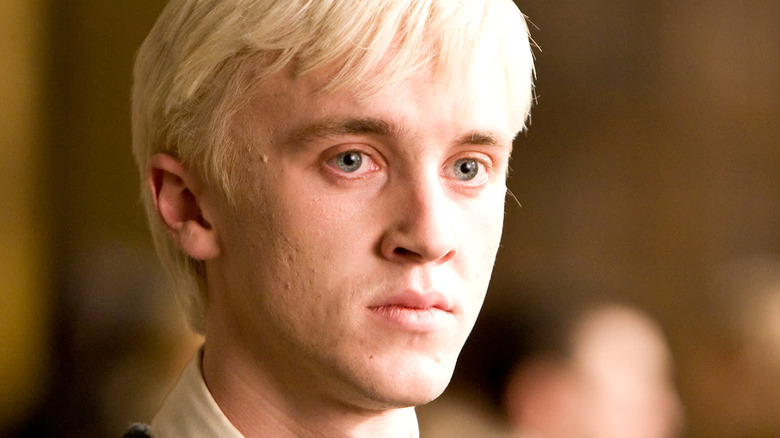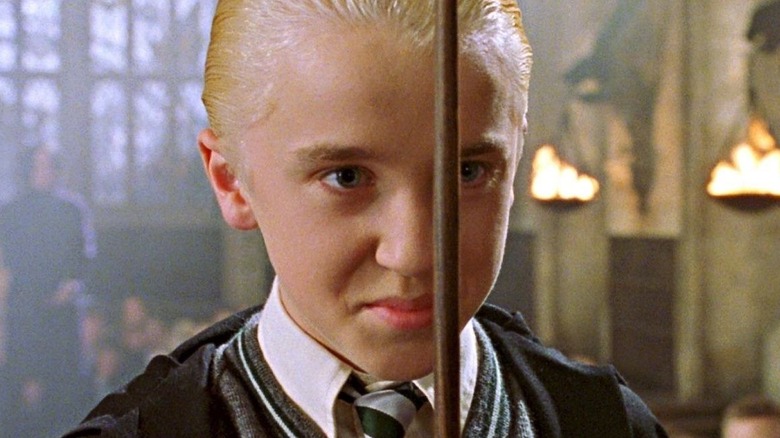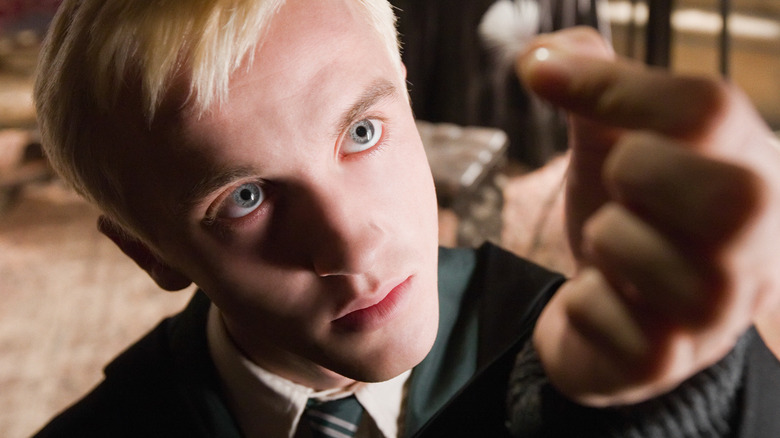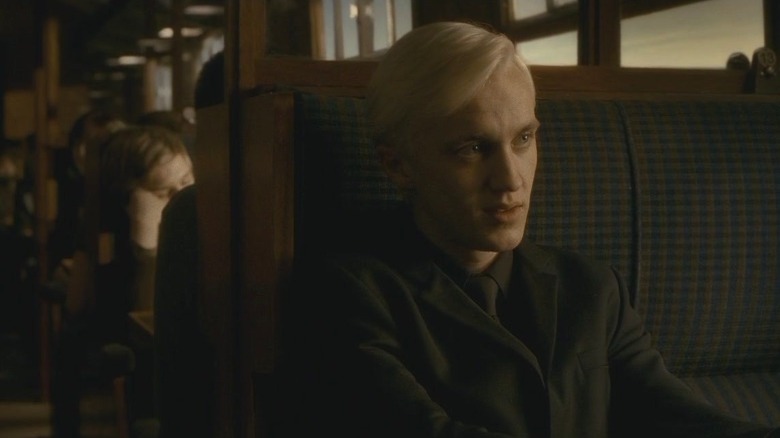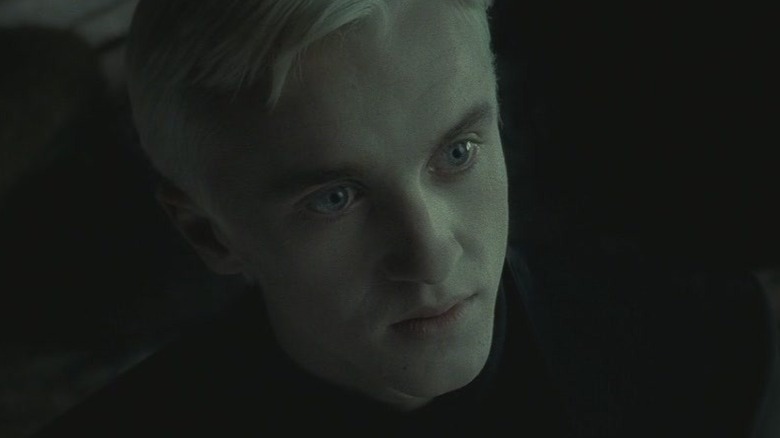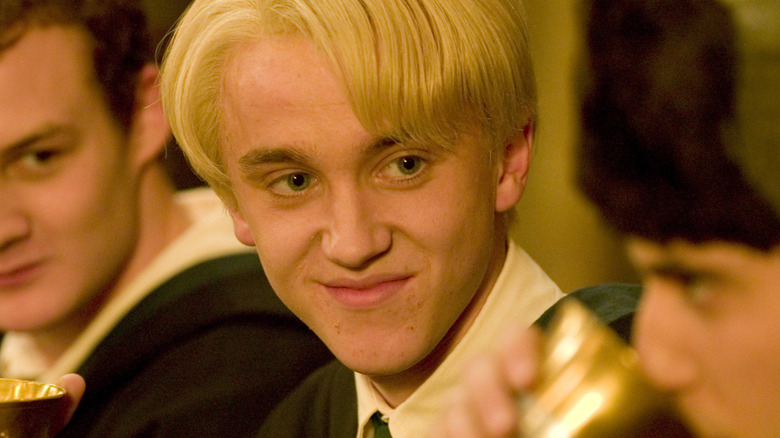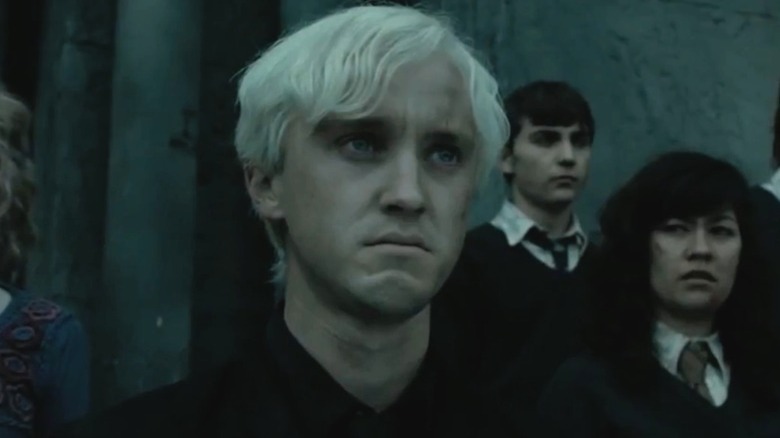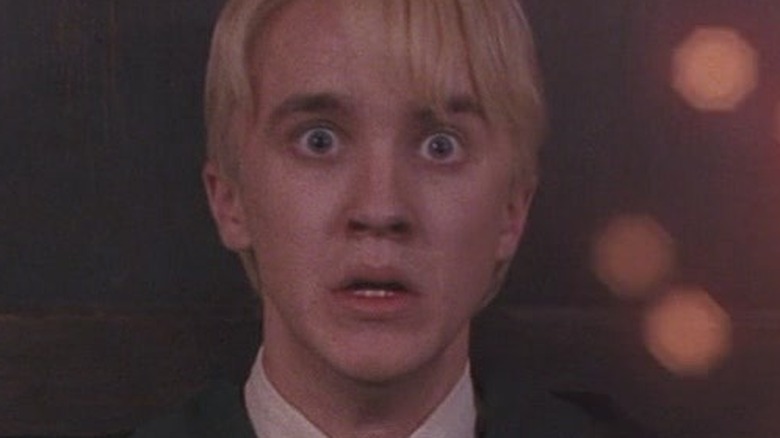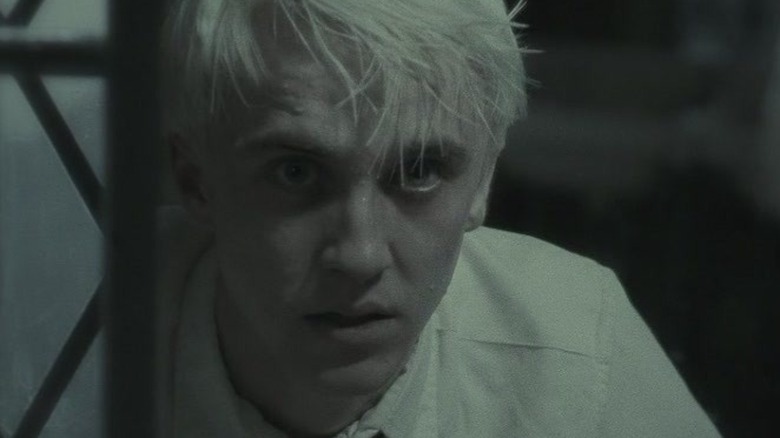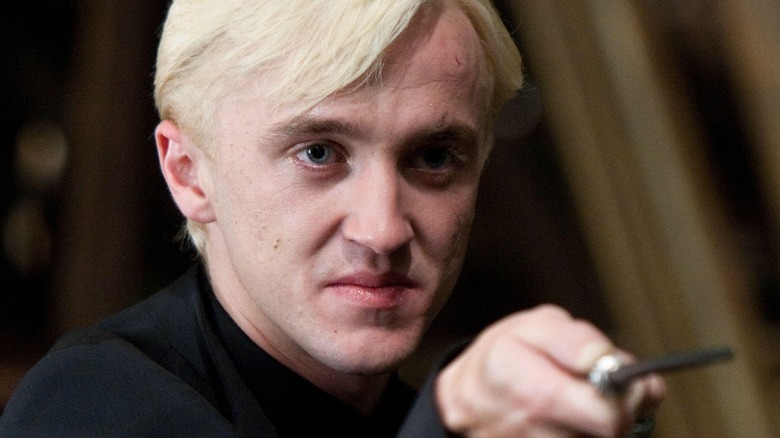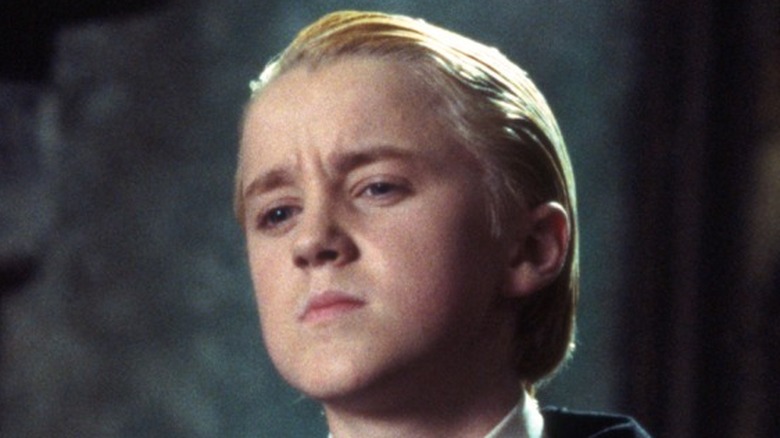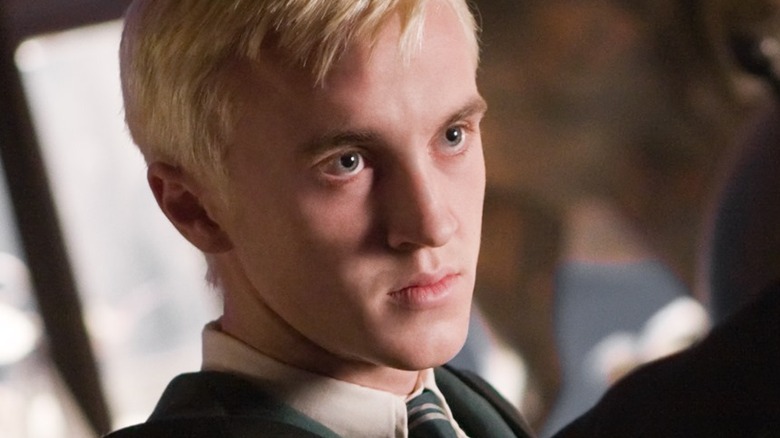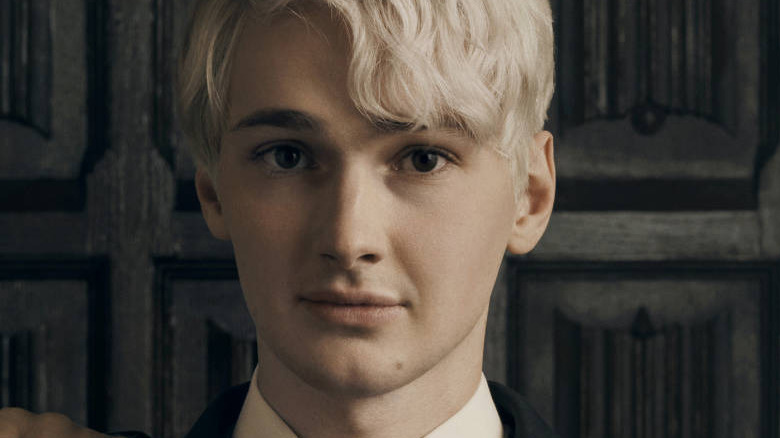The Untold Truth Of Draco Malfoy From Harry Potter
"Harry Potter" is home to many iconic characters. From The Boy Who Lived to the worst villain of the franchise (spoiler alert: it isn't Voldemort), there are characters fans and casual viewers of the movies can recognize instantly. Draco Malfoy, one of the main antagonists in the series, appears in all the books, films, and even the Broadway play, where his son is one of the main characters and heroes.
Draco is one of the first students to introduce himself to Harry on the Hogwarts Express in "Harry Potter and the Sorcerer's Stone," makes a name for himself by being attacked by a hippogriff, and even tries to prevent Harry from attending school during their sixth year. He was also observed freaking out about a spider, being turned into a ferret, and being on the other end of Hermione's wand. Tom Felton portrayed the character on screen, even channeling Draco's persona in his first interaction with Hermione's Emma Watson.
While the pure-blood is remembered for his instances of bullying, there are times when he wasn't all that bad. There is much more to him than many know, including that he turned away from the ideals that audiences know him for. Grab your trunk as we board the Hogwarts Express and share the untold truth of Draco Malfoy.
He's an only child
It should come as no surprise that someone with the type of entitled attitude Draco has is an only child. It isn't known if this was intentional, but looking back at the family tree shows that his father, Lucius, was also an only child. While the Slytherin regularly talks about his aunts and uncles on his mother Narcissa's side of the family, the only relative on his father's side that he mentions is his grandfather, Abraxas. Draco continues this trend with his own son, only having one child.
Narcissa, however, is one of three daughters, and has quite a large family. When you look at a family tree drawn by Rowling, as archived by The Harry Potter Lexicon, there are several individuals, including Harry's godfather Sirius Black, that have been blasted off the tree for one reason or another that amounts to them being considered traitors. Even with those individuals exiled, the Black family is much bigger than the Malfoy family, and there are very few couples with only one child.
He is named after the stars
While he inherits being an only child from his father's side of the family, his name comes from his mother's. Narcissa was born a Black (so was Bellatrix Lestrange), and they have a unique theme for their baby names. The House of Black tends to name their children after the stars or entire constellations, and Narcissa did just that with her only son. Draco, which means "dragon" in Latin, is a constellation that was first described by the Greek astronomer Ptolemy (via Constellation Guide). It is located in the northern sky, and can be seen at any time of year from the Northern Hemisphere.
However, the character, like many others in the series, almost had a different last name. While Malfoy, which is said to mean "bad faith" when translated from French, certainly suits his character, his last name was originally Spungen. It was crossed out and changed to Spinks in Rowling's original list of 40 students, and then crossed out again only to be reinserted on the list as Draco Malfoy. Though not mentioned on the original list of 40 characters, Rowling also admits that one of his working last names was Smart. His final name definitely has a better ring to it than the first iteration would have (via Wizarding World).
His family is associated with nobility
The Malfoy ancestry goes back to Normandy and the Norman Conquest of 1066. Armand Malfoy accompanied William the Conqueror on his occupation of Britain, working as part of his team, offering what is thought to be some type of magical service. At this time, there was no Statute of Secrecy, so wizards could show their magic to Muggles. What Armand did for the Duke of Normandy isn't known, but it's been decided by wizarding historians it wasn't always honest work (via Wizarding World).
With the invasion came his ancestor's assimilation into Britain and its culture. He worked to flatter the nobility and wealthy individuals, working his way into their inner circles. This allowed the family to become one of the most well-off wizarding families in the country, with most of the patriarchs never needing a traditional job to maintain their wealth.
As audiences have come to know, Armand had many of the traits of his descendants. He did some dubious work for an individual that invaded another country, tried to find power and prestige with anyone he deemed worthy, and believed he and his family were superior to other wizarding families and to Muggles. It's no wonder that Draco acted the way he did in his youth; it's been in his family tree for almost a century.
His ancestry's double standard
Despite preaching their hatred for Muggle-born witches and wizards, before the Statute of Secrecy was passed, they regularly aligned themselves with Muggles of wealth and high status. The first Lucius Malfoy even tried to marry Queen Elizabeth I. The Malfoy family will do whatever they feel suits them, and at one point that was being connected with Muggles they felt were worthy of their friendship or support. They relied on these social circles to such an extent that, when the Statue of Secrecy was being drafted, they were adamantly against its enactment (via Wizarding World).
It is even rumored that the Malfoys gained their wealth through Muggle means. This would mean they used Muggle assets, like maybe the London Stock Exchange, to build wealth and then have it exchanged into wizarding currency by Gringotts. They used their in with Muggles to snatch up Muggle land, adding to their sprawling estate, and built a collection of Muggle treasures. William the Conqueror, a Muggle, even gave them the manor the family still lives in. Without Muggles, they wouldn't be where they are today (via The Gamer).
Future generations of Malfoys have denied any of this ever happened, but history, and the evidence, are not on their side.
He almost went to Durmstrang
Audiences will best know Durmstrang Institute as one of the wizarding schools that participate in the Triwizard Tournament during "Harry Potter and the Goblet of Fire." It is known for the type of wizards that often graduate from the school, and the allegiance of their headmasters. Gellert Grindelwald, one of the most notorious Dark wizards of all time, was a student there (via Wizarding World). Though the school is described as being in Northern Europe, with any visitors required to have their memories erased so they can't lead people back to it, Rowling said in an interview archived by Accio-Quote that the school was likely in Sweden or Norway.
When students from the school visit Hogwarts during Draco's fourth year, he comments that his father "actually considered sending [him] to Durmstrang rather than Hogwarts,
you know." His reasons for going were because his family knew the headmaster, and for their Dark Arts education. The Slytherin ultimately didn't go because his mother didn't want him that far from home. While it isn't clear what her reasons were for not wanting her son to go abroad for school, it may have to do with their allegiance to Voldemort, their place within British wizarding society, or simply wanting her son to be close to home.
His family didn't actually buy their tickets to the Quidditch World Cup
Despite all their money, the Malfoys don't seem to pay for much. One major example is when they attended the Quidditch World Cup in "Harry Potter and the Goblet of Fire." In a stadium that fits 100,000, accordingly to Arthur Weasley, not everyone can get their tickets for free, but somehow the Malfoy family managed to snag seats in the Top Box. The three were invited as Minister of Magic Cornelius Fudge's special guests after a sizable donation they made to St. Mungo's Hospital for Magical Maladies, the wizarding hospital.
Getting to sit in the Minister of Magic's box is a usually unattainable seat. The Weasleys were able to secure tickets for the Top Box due to connections Arthur had with the Department of Magical Games and Sports, which only other Ministry workers would've had. As Lucius does not work for the Ministry (or for anyone other than Voldemort), he needed to go about getting access to one of the coveted 20 seats in a different way. Giving a donation at the perfect time was the way to do that. Being in the Top Box with the Minister of Magic only adds to the image they have of themselves. Why would one of the wealthiest wizarding families be seen in regular seating?
He supported Umbridge's rule over the school
During Draco's fifth year at Hogwarts, there were plenty of shake-ups in leadership roles at the school. With a Defense Against the Dark Arts professor that seems to be changing everything at the school on behalf of the Ministry, and Dumbledore evading the government in style, it was only a matter of time before an elite organization of students led by a professor emerged. Dolores Umbridge, a woman known for her pink attire, taught a less-than-stellar Defense Against the Dark Arts class and founded the Inquisitorial Squad in "Harry Potter and the Order of the Phoenix."
The squad consisted of students personally selected by Umbridge to carry out her dirty work. Like Prefects, they could take house points away from students, but they could also open and inspect mail. It should come as no surprise that all of the members were Slytherins, who were happy to report to someone other than Dumbledore. It was a great way for them to further bully students, as Draco takes away points from Harry simply because he doesn't like him, which would never fly under the supervision of another professor or headmaster.
He is well-versed in Occlumency
During his sixth year, Harry begins taking Occlumency lessons with Professor Snape to protect his mind from Voldemort. He is rubbish at it, but at least he makes an effort. The character who wasn't rubbish at it was Draco, as confirmed by Rowling. "I think Draco would be very gifted in Occlumency," the author described in an interview with MuggleNet in 2005. "But I thought of Draco as someone who is very capable of compartmentalizing his life and his emotions, and always has done."
It's revealed that the young Malfoy knows how to use Occlumency when Snape tries to pry into his mind in "Harry Potter and the Half-Blood Prince." The Potions Master asks what he is hiding from Voldemort, but Draco only tells him that he doesn't want his professor "butting in."
His aunt Bellatrix Lestrange is likely the one who taught him how to conceal his innermost thoughts, as it wasn't Snape, and there is no evidence that either of his parents was skilled enough in the practice. Being able to hide his thoughts about his mission for Voldemort was essential, as it was crucial no one knew what he was up to at Hogwarts that year. If you were trying to kill the headmaster, you'd want to keep that a secret, too.
His task from Voldemort was a punishment for his father's failure
It isn't common for a teenager to be given such a crucial task by Voldemort. So why was Draco trusted to kill Albus Dumbledore? In short, he wasn't. His father was supposed to steal a prophecy, one that speaks of who is meant to take down Voldemort, from the Department of Mysteries at the end of "Harry Potter and the Order of the Phoenix." He failed horribly when Harry, Ron, Hermione, and other members of Dumbledore's Army and the Order of the Phoenix showed up and stopped him.
This error resulted in Lucius being imprisoned in Azkaban. To make sure he knew how much he messed up, Voldemort made Draco take the Dark Mark that summer, and ordered him to kill his headmaster. He never expected the teen to survive the effort, which would be the ultimate punishment for Lucius, as he had no way to help his son from prison. While the Slytherin isn't the one to carry out the task, as carefully crafted by Dumbledore and Snape, the mission was completed.
The Malfoys did not regain their status, however, as Draco wasn't the one to cast the spell against Dumbledore. Though he was broken out of Azkaban with the rest of the Death Eaters, Lucius had to give Voldemort his wand, surrender his home, and watch as his son tortured Death Eaters in low standing. This caused the Malfoys to begin to turn away from Voldemort.
He studied Alchemy after attending Hogwarts
Like many Malfoys before him, Draco did not have to work due to his family's immense wealth. Rather than join up with Dark wizards like his father did to pass the time, he turned to more academic pursuits. He enjoys pouring over alchemical manuscripts, but not acting on them. While he reads the information that describes how to create the Philosopher's Stone, he doesn't try to make one for personal use (via Wizarding World). Though Alchemy is sometimes taught for NEWT level students at Hogwarts, it wasn't widely offered when the Slytherin attended.
That isn't to say he didn't maintain some of the family interests as well. Though he didn't follow the same beliefs as his parents anymore, he still kept up their show of wealth and luxury. The Malfoys had several collections of antiquities, including one filled with Dark artifacts. Draco kept the collection after the war, ensuring it remained within the family. Their home was raided by the Ministry during Draco's second year at Hogwarts in an effort to find the collection. To prevent the Ministry from finding his collection, Lucius created a secret underground room to house it in.
His wife died of a blood curse
While many may think Draco married Pansy Parkinson, he actually married a different Slytherin student. The young Malfoy married the younger sister of his peer Daphne Greengrass, Astoria. The two had a son together, Scorpius Hyperion Malfoy, who attends Hogwarts at the same time as the Golden Trio's children during the epilogue of "Harry Potter and the Deathly Hallows."
His parents did not approve of her. As part of their bigotries, they wanted him to marry someone that shared their ideals, even though Astoria's family was a member of the Sacred Twenty-Eight. The Greengrasses, like Draco, worked to overcome their prejudice against Muggle-born wizards, which did not sit well with Lucius or Narcissa. However, their son stood up to them, and married Astoria anyway.
Unfortunately, their marriage was not long-lived. One of his wife's ancestors had a curse placed on them. As described in "Harry Potter and the Cursed Child," the curse acted as a blood malediction, passed down through the generations, and could present itself at any time. Astoria grew weak, particularly after the birth of their child, and passed away the summer before Scorpius' third year at school. Her fragile state, and the rumors regarding who their son's father was, caused the Malfoys to isolate themselves from the world.
He didn't raise his son with the pure-blood mentality
Despite being raised to believe that pure-blood wizards were superior, Draco and Astoria didn't want to pass down these views to their son, instead raising him to be kinder to Muggles, and more accepting of witches and wizards that aren't pure-bloods. This did cause some strain at family events, as the older Malfoys still held their beliefs despite their changed views on Voldemort by the end of the war (via Wizarding World).
This more tolerant lifestyle led to Scorpius becoming friends with people his grandparents might call "blood traitors," or deem unworthy of their family's friendship. In "Harry Potter and the Cursed Child," he becomes friends with Harry's son Albus, who was sorted into Slytherin, unlike the rest of his family. Instead of making fun of him or ostracizing him like the other members of his house do, Scorpius is excited his new friend will be with him on their journey to Hogwarts. Neither of them is very popular, due to the rumors that spread about different aspects of their lives. If Draco had taught his son the same values he was, it's very likely Scorpius wouldn't have become friends with the Potters' son, and would've bullied him for being the black sheep of his family.
